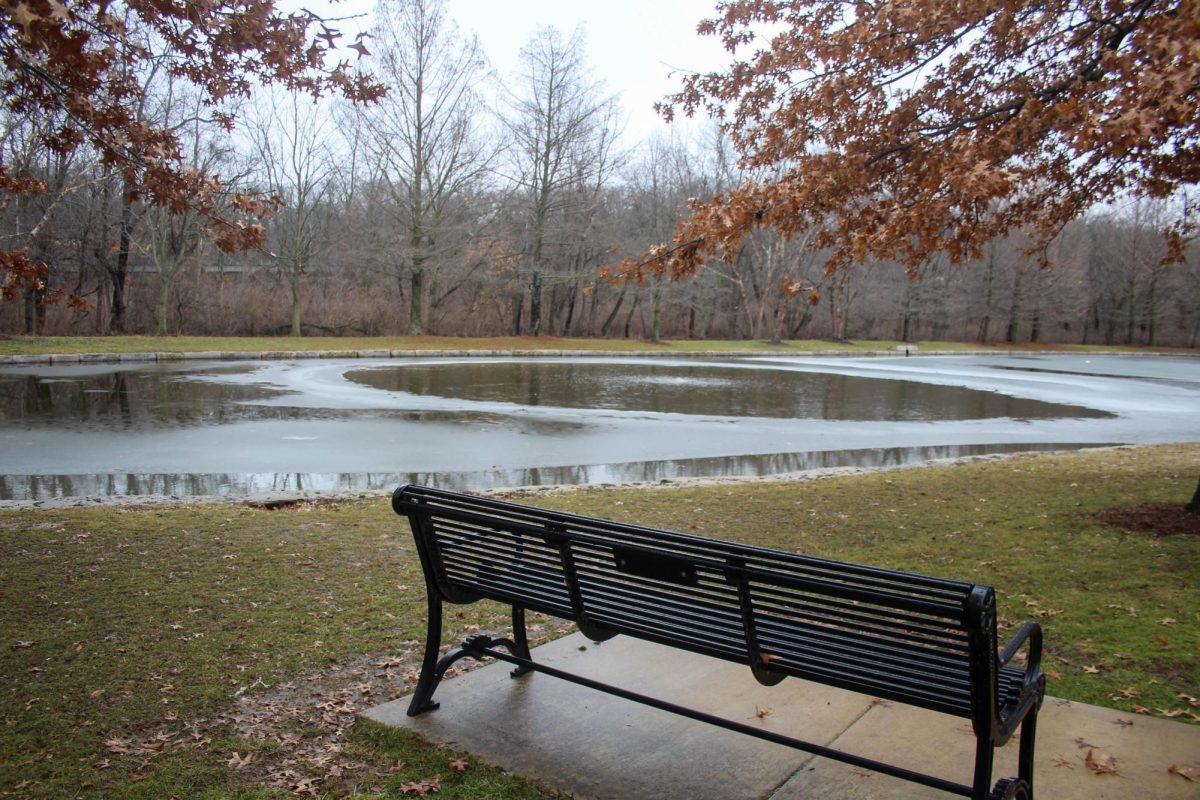story and photos by Emma Willibey
7 p.m. The band enters amid shouts and clinking glasses. Music envelops the room, the rebellious mood swells and, in an hour, the performers have packed their instruments. Stepping outside, they stroll past houses until locating the next club.
8 p.m. The band’s rich sounds invigorate another crowd.
9 p.m., midnight, 2 a.m.
“[The clubs] were operating 24 hours a day or close,” American Jazz Museum education manager Bill McKemy said. “[There] wouldn’t always be music, but there were drinks and gambling.”
According to McKemy, jazz “grew up” in Kansas City. The city’s 1925-1939 jazz age matched the term of political boss Tom Pendergast, whose dismissal of Prohibition fueled Kansas City’s lawless reputation. National interest in rock and pop, while reducing the amount of recognition Kansas City’s jazz receives, has also tightened the jazz community, McKemy said.
“Now, we can look around and at least say jazz is not at the top of the pop charts,” McKemy said. “Now, it’s taken its form as an art music.”
Jazz developed in New Orleans, La., in the early 1900s, with many musicians frequenting a prostitution-stricken neighborhood called Storyville, McKemy said. When the department of the Navy prepared to station troops in New Orleans, the city closed Storyville to prevent the men from partying. In ending jazz performances, the shutdown destroyed musicians’ financial framework.
“[A] huge number [of performers] left New Orleans [and] went to Chicago, Kansas City and New York City,” McKemy said. “[Storyville’s shutdown] set in motion the dispersion of the New Orleans sound.”
The sound settled in Kansas City’s 18th and Vine, an African-American community.
“It was a city within a city,” McKemy said. “Whatever types of professional services, whatever people needed to have, if they were African-American, they were shopping here.”
In this creative hub, Kansas City’s jazz style formed. According to McKemy, a quick pace characterized early jazz material like Louis Armstrong’s “Hot Fives & Sevens.” In Kansas City, musicians distinguished themselves by integrating the blues into New Orleans jazz.
“The Kansas City musicians were generally playing the material [with a] slower, more relaxed feel,” McKemy said.
When frequent KC performer Count Basie played on a national radio broadcast, jazz musicians across the country adopted the swing style, McKemy said.
“[Count Basie] changed the feel of the music from [dance phenomenon] ‘The Charleston’ to the [bluesy] ‘One O’Clock Jump,’” McKemy said.
When Pendergast’s tax-evasion charges forced his term to end, Kansas City’s vibrancy faded, according to McKemy. Forced into reform, the city left musicians few opportunities to earn revenue. Thus, jazz musicians sought radio jobs in other cities.
“The musicians that were able to go to New York and get on NBC or whatever, that was much higher potential than playing clubs anywhere,” McKemy said.
The residential stronghold on 18th and Vine deteriorated with jazz culture, as amendments to segregation allowed African-Americans in other KC areas, McKemy said.
“All of sudden everyone can go to the Sears and Macy’s downtown,” McKemy said. “The neighborhood kept dwindling.”
Recently, housing projects and institutions such as the American Jazz Museum have sparked interest in 18th and Vine, but McKemy said redevelopment is “a work in progress.”
“Things seem to be going in a sustainable and healthy direction currently,” McKemy said.
The jazz scene, however, has never lost its followers. According to McKemy, the genre’s community has spread throughout the city, with notable venues ranging from Midtown’s Broadway Jazz Club to Take Five Coffee + Bar at 135th Street and Metcalf Avenue.
“A Johnson County establishment is vastly different than [venues of] the heyday,” McKemy said.
But, while jazz’s community remains strong, public knowledge of the genre has narrowed since the 1930s. Jazz musician Laura Chalk, who grew up in Kansas City, said she did not become familiar with the area’s jazz history until her 20s. According to Chalk, Kansas City’s Prohibition-era jazz scene deserves every resident’s attention.
“If we had programs that taught [jazz history] in schools … I think that there would be a lot of kids, young people tuned in to what was going on,” Chalk said.
According to Green Lady Lounge owner John Scott, Kansas City’s jazz venues serve as educational tools. Even those who enter Green Lady Lounge without jazz knowledge will be hard-pressed not to love the material, Scott said.
“[Jazz is] not popular music of the day, and it hasn’t been for a while—it’s been a niche genre,” Scott said. “But it is always … quality music.”
[nggallery id = 916]
However, encouraging “quality music” does not mean booking musicians who imitate the greats, Scott said.
“Kansas City is … full of fantastic musicians,” Scott said. “That’s the easy part [of booking performers]. Then, I didn’t want these bands to play traditional jazz. I wanted to move the genre forward with original compositions.”
McKemy cited trumpeter Hermon Mehari as an innovator in Kansas City jazz. Like his predecessors, Mehari cannot cultivate his sound in one place, and he will travel to Australia as a semifinalist of the Thelonius Monk Institute of Jazz’s 2014 Trumpet Competition. But, also like his predecessors, Mehari remembers to honor the Kansas City community.
“When [Mehari is] in town, you can see him for free almost any night of the week,” McKemy said.






